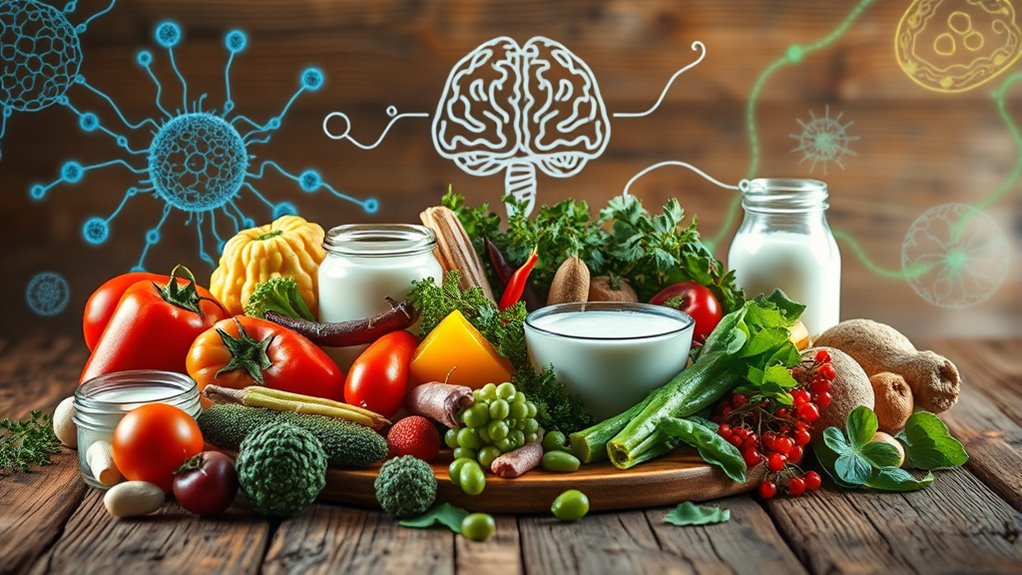Probiotics can positively impact your mood by balancing your gut bacteria, which influences neurotransmitter production like serotonin and GABA. This connection, known as the gut-brain axis, suggests that improving gut health may reduce symptoms of depression and anxiety. Consuming probiotic-rich foods or supplements supports this process, helping to strengthen gut barrier function and decrease inflammation. If you’re curious about how probiotics might fit into your mental health routine, there’s more to explore ahead.
Key Takeaways
- Probiotics support gut microbiota balance, enhancing neurotransmitter production like serotonin and GABA, which influence mood.
- A healthy microbiome reduces gut inflammation, lowering stress and anxiety levels linked to mood disorders.
- Consuming probiotic-rich foods or supplements can improve mental health by strengthening the gut-brain axis.
- Specific probiotic strains can modulate mood and cognition, with strain selection and dosage affecting effectiveness.
- Future personalized probiotics and microbiome therapies hold promise for targeted mood disorder treatments.
Understanding the Gut-Brain Connection
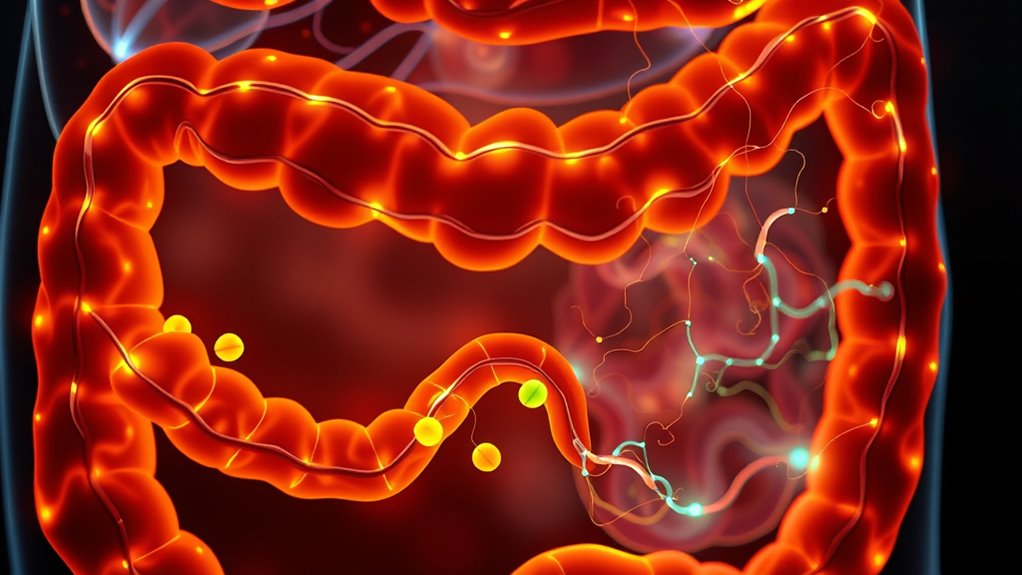
The gut-brain connection is a complex communication network that links your digestive system and your brain, allowing them to influence each other’s functions. You can improve this connection by consuming dietary fibers, which support healthy gut bacteria and promote overall gut health. When your gut is balanced, it can better send signals to your brain, influencing mood and stress levels. Dietary fibers help reduce inflammation and support stress reduction, making it easier to manage anxiety and improve mental well-being. Additionally, maintaining a healthy gut microbiome can contribute to resale value of probiotics and related products, emphasizing their importance in overall health. Incorporating probiotic-rich foods can further enhance this gut-brain communication, leading to improved mental health outcomes. Recognizing the role of essential oils in supporting relaxation and mood can also complement dietary strategies, further strengthening the gut-brain axis.
How Probiotics Affect Gut Health

Probiotics play a key role in enhancing gut health by introducing beneficial bacteria directly into your digestive system. These live microorganisms help balance your gut microbiota, supporting digestion and overall function. Consuming fermented foods like yogurt, kefir, and sauerkraut naturally provides probiotics. Additionally, dietary fibers act as prebiotics, nourishing the healthy bacteria and helping them thrive. When you include fiber-rich foods in your diet, you promote the growth of probiotics, which improves gut barrier integrity and reduces inflammation. This synergy between probiotics, fermented foods, and dietary fibers creates a healthier gut environment. A well-balanced gut supports digestion, nutrient absorption, and immune function, setting a foundation for better overall health and mood. Sound healing science has also explored how the gut-brain axis can be influenced by various sensory stimuli, including vibrations and frequencies, further reinforcing the connection between gut health and mental well-being.
The Science Linking Gut Microbiota to Mood

You might be surprised to learn that your gut bacteria can influence your mood through the production of neurotransmitters like serotonin. Inflammation in your gut also plays a role, potentially affecting how you feel emotionally. Understanding these connections can help clarify how your gut health impacts mental well-being. Additionally, gut microbiota diversity may influence how effectively these neurotransmitters are produced and utilized. Recognizing the impact of for sale 100 on gut health can also open new avenues for supporting mental health through dietary interventions.
Microbiota and Neurotransmitters
Emerging research reveals that the gut microbiota can influence mood by producing and modulating neurotransmitters, which are chemical messengers important for brain function. Through microbial signaling, your gut bacteria communicate with the nervous system, impacting neurotransmitter synthesis. Certain microbes produce GABA, serotonin, and dopamine, directly affecting your mood and emotional responses. For example, some strains of Lactobacillus and Bifidobacterium can increase GABA levels, promoting relaxation. Others influence serotonin production, which regulates happiness and well-being. This microbial signaling helps establish a bidirectional connection between your gut and brain, shaping mood and mental health. Understanding how gut bacteria influence neurotransmitter synthesis reveals new avenues for targeting mood disorders with probiotics and dietary interventions. Your microbiota plays a significant role in the chemistry governing your mental state.
Gut Inflammation and Mood
Research shows that gut inflammation can markedly impact mood by disrupting the delicate balance of the gut-brain axis. When inflammation occurs, it triggers immune responses that can lead to increased stress and feelings of anxiety or depression. Managing gut inflammation helps promote stress reduction, which benefits your overall mental health. Probiotics and dietary interventions support immune modulation, reducing inflammatory signals that affect brain function. By lowering inflammation, you can help maintain a healthier gut-brain connection, improving mood stability. The key is to focus on strategies that calm gut inflammation, thereby lessening its influence on your emotional well-being. This connection highlights the importance of gut health in regulating mood and underscores the potential of targeted therapies to improve mental health outcomes.
Research Findings on Probiotics and Depression
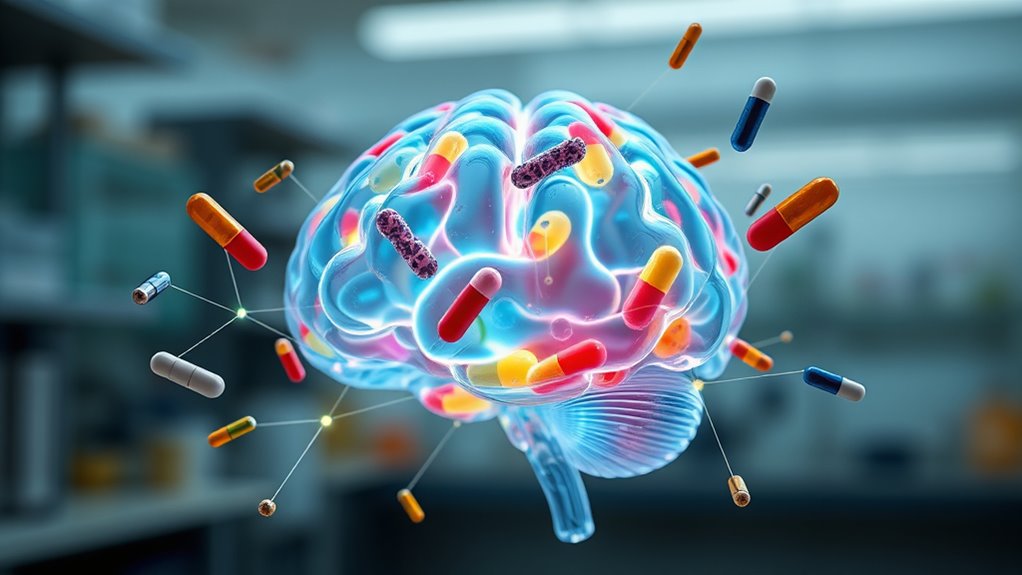
Recent studies have shown that probiotics can influence depression symptoms by modulating the gut-brain axis. These benefits stem from fermentation benefits, which enhance the production of beneficial compounds that support mental health. Researchers have found that consuming probiotic sources like yogurt, kefir, and fermented vegetables can positively impact mood. Clinical trials indicate that supplementing with specific probiotic strains reduces depressive symptoms and improves mood stability. These findings suggest that probiotic intake influences gut bacteria balance, leading to increased production of neurotransmitter precursors and anti-inflammatory agents. While more research is needed, current evidence supports incorporating probiotic-rich foods into your diet as a potential strategy to manage depression. This approach leverages the gut-brain connection to promote better mental well-being.
The Role of Gut Bacteria in Anxiety Management
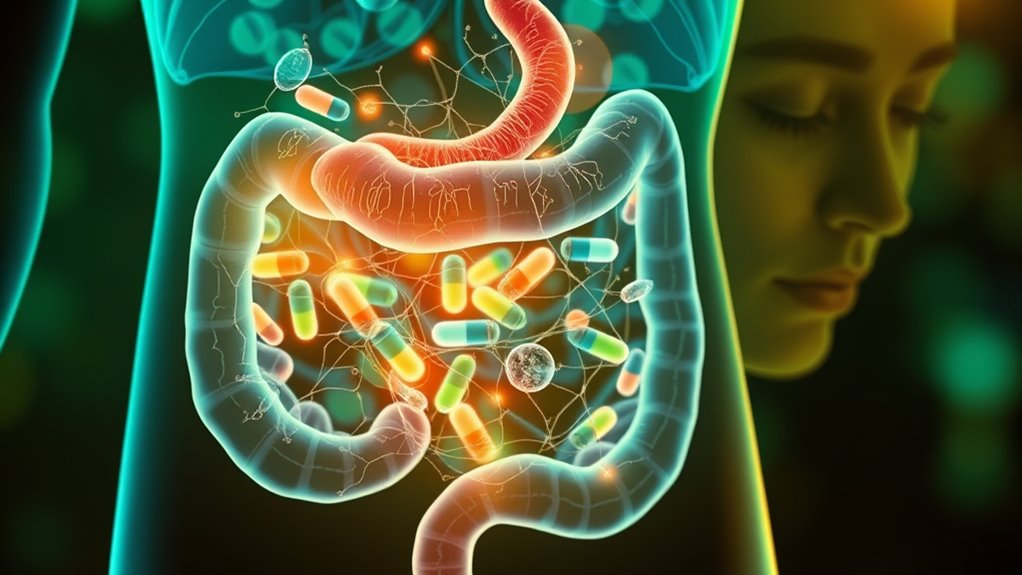
Since gut bacteria influence the production of neurotransmitters and inflammatory markers, they play a crucial role in managing anxiety. Your gut bacteria affect how your body responds to stress, impacting mood and overall anxiety levels. Dietary influences profoundly shape your gut microbiome, which in turn influences your stress management. Regularly consuming probiotic-rich foods can help support a healthy microbiome and improve mental health. Utilizing vertical storage solutions and other organization techniques can help create a calmer environment that supports mental well-being. Moreover, the composition of your gut microbiome is linked to the broader field of AI security, emphasizing the importance of maintaining balanced and healthy bacterial populations for mental health.
Incorporating Probiotics Into Mental Health Strategies

When adding probiotics to your mental health routine, choosing the right strains is vital for effectiveness. You also need to think about the proper dosage and the best time to take them for maximum benefit. Understanding these factors helps you create a targeted approach to support your gut-brain connection. Incorporating mindfulness techniques can further enhance the benefits by promoting relaxation and reducing stress, which are crucial for maintaining a healthy gut-brain axis. Engaging in meditation can help regulate stress hormones and improve overall mental well-being, reinforcing the positive effects of probiotics.
Selecting Effective Strains
Choosing the right probiotic strains is essential for effectively integrating probiotics into mental health strategies. Strain specificity matters because different strains have unique effects on the gut-brain axis. Personalized approaches help tailor probiotics to your specific needs, maximizing benefits. When selecting strains, consider:
- Strains proven to reduce anxiety and improve mood
- Those that support gut barrier integrity
- Strains with documented influence on neurotransmitter production
- Compatibility with your existing health conditions
- The importance of understanding pre-existing conditions that may affect probiotic efficacy
- Awareness of specific glycolic acid benefits for skin, which can influence overall health and well-being, complementing probiotic use.
- Understanding the role of natural materials in supporting a healthy gut environment can enhance probiotic effectiveness.
Optimal Dosage Guidelines
Determining the essential probiotic dosage is crucial for effectively supporting your mental health goals. Personalized dosing depends on factors like age, health status, and specific probiotic formulations. To visualize, consider this simple guide:
| Probiotic Formulation | Typical Daily Dose |
|---|---|
| Multi-strain blends | 1-10 billion CFUs |
| Single-strain formulas | 5-20 billion CFUs |
Your ideal dose may vary, so start with a lower amount and adjust based on response. Always consult a healthcare professional for personalized recommendations. Proper dosing ensures you receive the maximum benefit without unnecessary excess, making probiotics a valuable part of your mental health strategy. Additionally, selecting appropriate probiotic strains can further enhance mental health outcomes, especially strains known for their impact on the gut-brain axis. Understanding strain-specific benefits helps tailor your supplement choices to support mood regulation effectively.
Timing of Intake
Incorporating probiotics into your mental health routine requires paying attention to the timing of intake to maximize their benefits. Meal timing and supplement scheduling play key roles in enhancing probiotic effectiveness. Take note of when you eat and plan your supplement intake accordingly:
- Consume probiotics with meals or shortly after eating to protect bacteria through stomach acid.
- Space out doses consistently each day to maintain steady probiotic levels.
- Avoid taking probiotics on an empty stomach, which can reduce survival rates.
- Consider taking your supplement at the same time daily for better routine adherence.
- Using proper storage methods can also preserve the potency and viability of probiotic strains.
Potential Benefits and Limitations of Probiotic Use
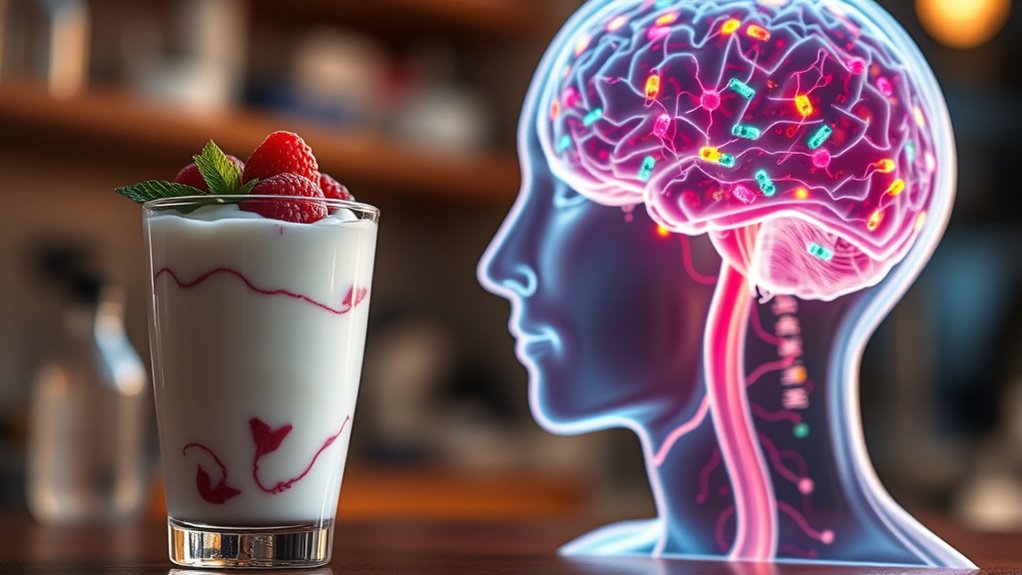
Probiotics offer promising benefits for gut health and may positively influence the gut-brain axis, potentially improving mood, cognition, and stress response. However, it’s important to be aware of possible probiotic side effects, such as bloating, gas, or mild digestive discomfort, especially when starting new strains. While many tolerate probiotics well, the limitations of probiotic therapy include variability in strains, dosages, and individual responses. Not everyone experiences significant mental health improvements, and results can differ based on underlying health conditions. Additionally, probiotics are not a cure-all and should complement, not replace, other treatments. Consulting with a healthcare provider helps guarantee safe use and realistic expectations regarding their potential benefits and limitations. It is also worth noting that the efficacy of probiotics can depend on factors such as strain specificity and proper formulation quality control. Furthermore, understanding the role of natural techniques and optimal conditions in probiotic effectiveness can enhance their impact on health.
Future Directions in Gut-Brain Axis Research
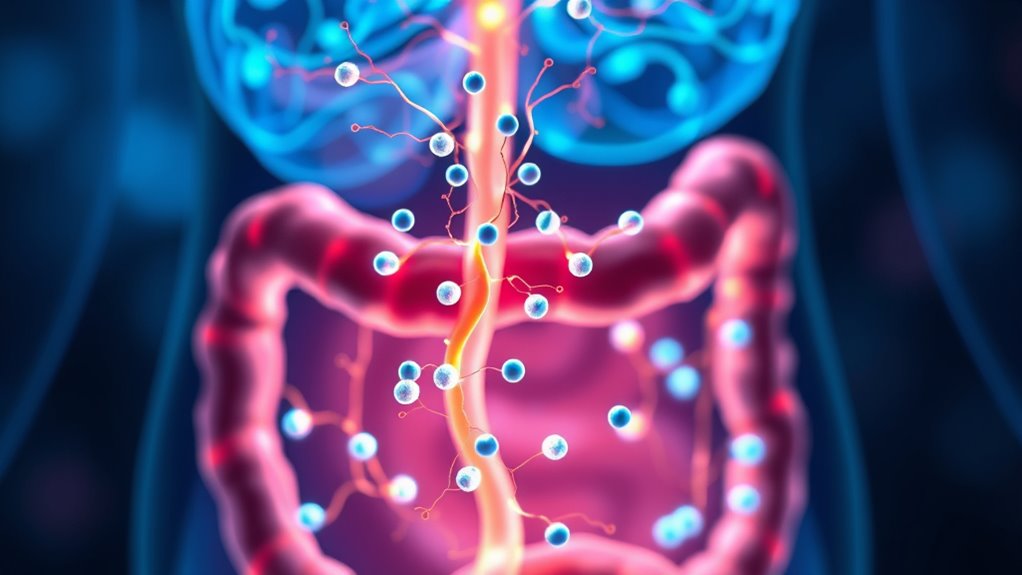
Advances in technology and interdisciplinary approaches are shaping the future of gut-brain axis research, opening new avenues for understanding how the microbiome influences mental health. You can expect personalized probiotics tailored to individual microbiota profiles, enhancing treatment effectiveness. Microbiota engineering will enable precise modifications of gut bacteria to target specific mood disorders. Cutting-edge tools like metagenomics and machine learning will refine our ability to predict responses and customize therapies. Imagine a future where mental health treatments incorporate microbiome assessments, leading to more effective interventions. The focus will be on integrating microbiome data into personalized medicine, fostering innovative strategies that optimize gut-brain communication. This progress promises to revolutionize how you approach mood disorder management, making treatments more targeted and effective.
Frequently Asked Questions
Can Probiotics Replace Traditional Mental Health Treatments?
You might wonder if probiotics can replace traditional mental health treatments. While they can support your mental well-being by increasing microbiome diversity and reducing gut inflammation, they shouldn’t be seen as a complete substitute. Probiotics may complement therapy or medication but aren’t a standalone solution. Always consult a healthcare professional before making changes to your mental health approach, as personalized treatment plans remain essential for effective care.
Are Certain Probiotic Strains More Effective for Mood Disorders?
Your curiosity about probiotic strains’ effectiveness for mood disorders is crucial, as it could reveal new therapeutic potentials. Some strains, like Lactobacillus rhamnosus and Bifidobacterium longum, show promising efficacy evidence, but strain specificity matters greatly. Not all probiotics are equal—research indicates certain strains may be more effective due to their unique effects on the gut-brain axis. So, choosing the right strain could make all the difference in mood improvement.
How Long Does It Take to See Mood Improvements From Probiotics?
When wondering how long it takes to see mood improvements from probiotics, keep in mind the timeframe expectations vary due to probiotic variability. Some people notice changes within a few weeks, while others may need several months. Your results depend on factors like strain types, dosage, and individual gut health. Be patient and consistent with your probiotic routine, as noticeable mood benefits typically develop gradually over time.
Are There Any Risks or Side Effects Associated With Probiotic Use?
While exploring probiotic safety, you might wonder about side effects. Generally, probiotics are safe for most, but some may experience mild issues like bloating or gas. To manage side effects, start with a low dose and gradually increase. If you notice persistent discomfort, consult your healthcare provider. Remember, side effect management is key to enjoying probiotic benefits safely, ensuring you support your health without unintended hiccups.
How Do Diet and Lifestyle Influence Probiotic Effectiveness for Mental Health?
Your diet and lifestyle can markedly impact how effective probiotics are for mental health. Focus on diet synergy by eating fiber-rich foods and fermented products to support beneficial bacteria. Incorporate lifestyle modifications like regular exercise, stress management, and adequate sleep, which enhance probiotic benefits. These changes create a supportive environment for probiotics to thrive, helping to improve mood and overall mental well-being.
Conclusion
By now, you can see how probiotics act as tiny gardeners, tending your gut to nurture your mood. Embracing these beneficial bacteria might just be the secret ingredient in your mental health recipe. While they hold promise, remember they’re part of a bigger picture, not a magic wand. Keep exploring, stay curious, and let your gut-brain connection bloom—because a happy gut truly can lead to a happier you.
